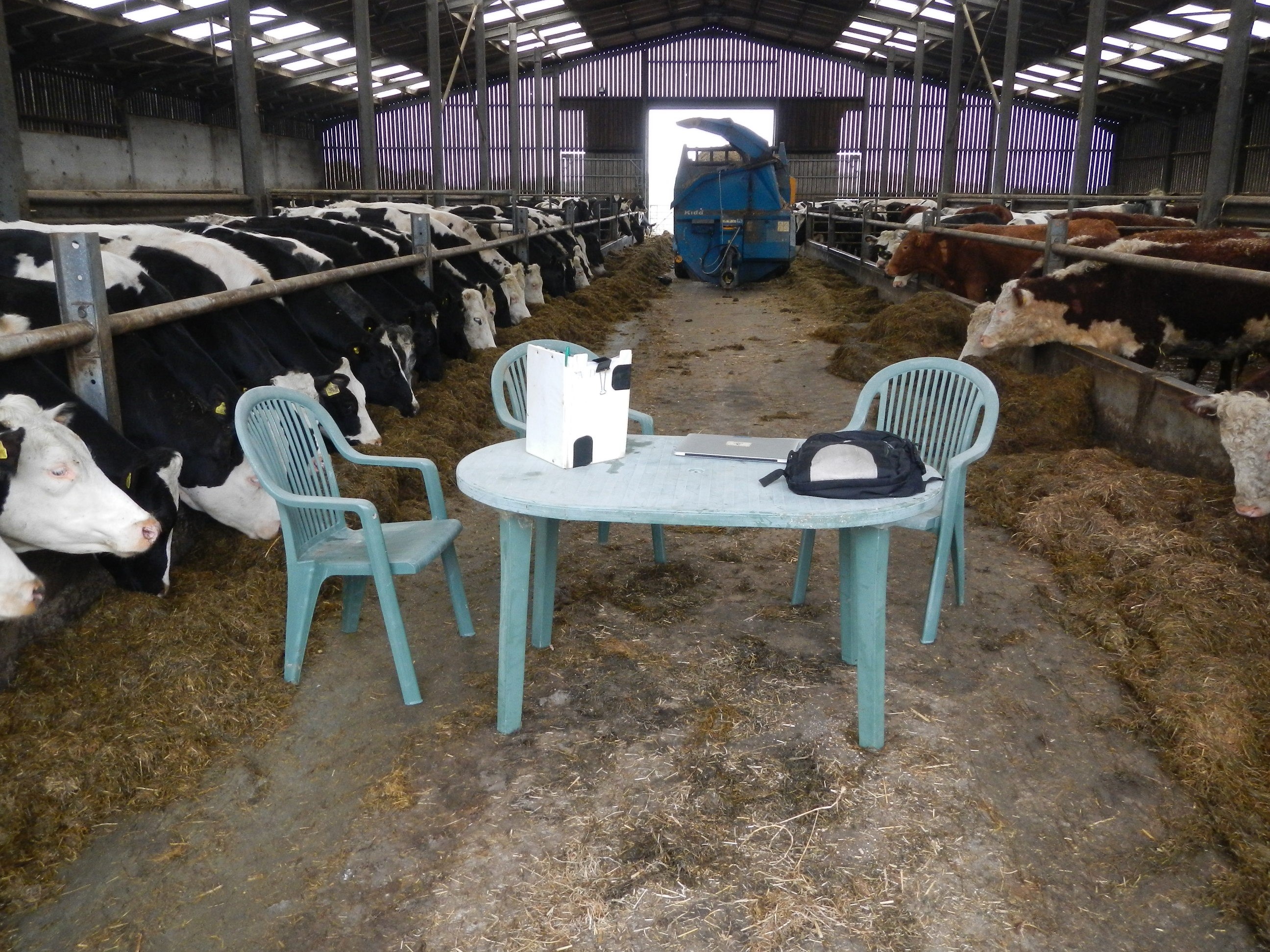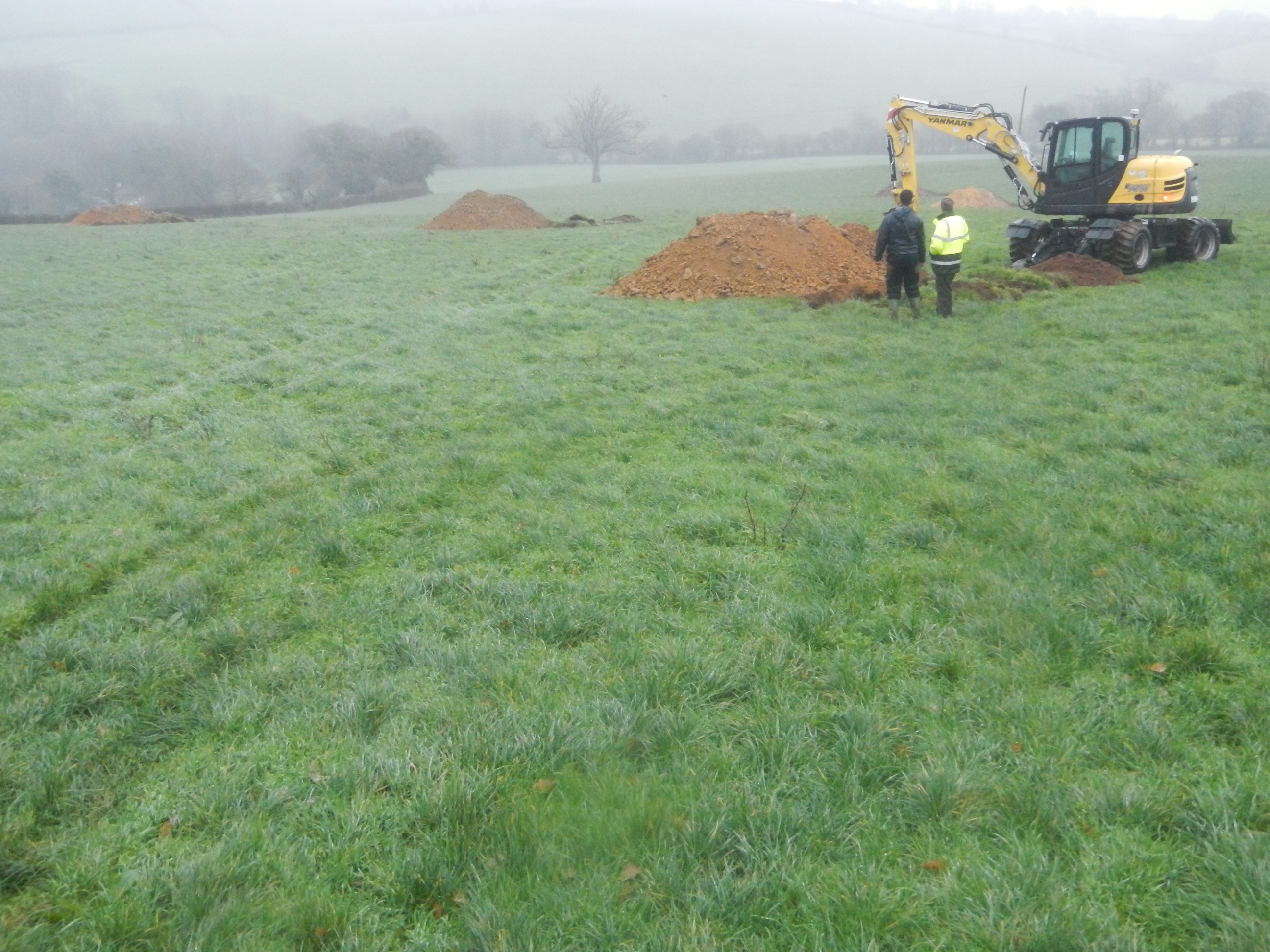

Bob Watson's Story
Bob Watson joined IAgrE 29 years ago, shortly after joining ADAS as a Mechanisation Adviser, working from their Starcross office, near to Exeter. A lot of his time was involved in giving practical farm advice to improve farm manure handling, storage, and land application - driven by new regulations and grant assistance to farms at that time. He developed a particular interest in earth-lined lagoons as a lower cost storage option compared to steel and concrete structures, and was part of the technical team that re-wrote the CIRIA 759b guide on slurry storage, published in 2015. In a self-employed capacity, over the past 5 years Bob has made around 70 appraisals on-farm to look at the site and soil suitability for earth-lined lagoon construction.
 |
 |
|
The ‘new normal’ farm office and well-ventilated meeting room. The challenge is to get the chairs two metres apart, and out of licking range of the inquisitive cows. |
Digging test pits for lagoon soil suitability appraisal. Farm family members living in the same house don’t need to socially distance, but contractors staff who go home to separate families do. |
Under pre-lockdown conditions, the appraisal visit typically involved sitting in the farm kitchen for an hour also with the farm family and contractor present. During this session they would jointly consider the practicalities of the farm layout and volumes to be stored from which Bob would calculate required lagoon size. He would also discuss the technicalities of earth-lined lagoon construction, using a pre-prepared presentation on his laptop. In the field, he would then dig the required five test pits (to assess soil types and stone content etc.) and would take a soil sample for later permeability testing. This would be followed up by a 20 page illustrated report which would inform the farm and contractor of his findings, and be in a suitable format to present to the Environment Agency and local Planning Authority.
Bob says: “The enquiries haven’t stopped coming in, but in the early days of lockdown I was concerned that this work could not be considered as ‘essential’, so put all visits on hold. More recently however, looking more closely at the guidance based on the Statutory Instrument 2020 No. 350 released on 26th March (sections 6f and 7b), and speaking with IAgrE’s Ed Hansom on the phone, I realised that farm lagoon appraisals could be could continue to be made, because I certainly could not do them at home! To date, I have made two appraisals during lockdown.
On a personal level, the required biosecurity measures are not difficult to implement if we meet in a well ventilated farm building for the initial meeting, maintain a two metre distance from each other, and avoid contact or surface transfer via passing sheets of paper or tablets, phones, etc. When digging the test pits at the lagoon site, the same biosecurity measures can be easily adhered to. Contractors, their drivers, and other farm staff probably go back to different families at the end of the day, so they should be constantly considering coronavirus biosecurity whilst at work, but I have witnessed quite a few slip-ups and direct person-to-person contacts made, or nearly made. One example was when the elderly owner of the local contracting company arrived later to a field site meeting that was in progress, and immediately offered out his hand for a traditional handshake greeting to each person present! Equally concerning was that all but me responded and shook his hand.
Having worked full-time for three months during the foot and mouth epidemic of 2001 (‘clean’ and ‘dirty’ categories) and subsequently, farm biosecurity considerations have become second nature, so it has not been difficult to take the coronavirus guidelines into account in addition when doing farm lagoon appraisals. There are a couple of things that I would add to the general government guidelines though:
- When in the open-air, keep an eye on the wind direction and try to position yourself so that you are across the wind from the person you’re speaking to. This could help cut down on droplet transmission while having a conversation.
- Face masks are a good idea for reducing droplet transmission from a potentially infected person, though they can make conversation difficult in a noisy environment.
- Think carefully if somebody wants to share printed information, pens, or an electronic device (this often happens when showing photos on mobile phones). If you have to pick something up, use hand gel immediately for cleansing. This will reduce transmission risk and subtly let the other person know that maybe they should be more careful.
- When walking about the farmyard or in the field with machinery around, be careful not to touch or lean on anything to avoid the possibility of a transmission by surface contact.
- And of course, do not jump into anybody else’s vehicle, even if offered - proximity and surface contacts are high-risk in this situation
Ed Hansom, CEO of the IAgrE says: “Bob’s work obviously requires him to interact with customers at their place of work/homes which requires constant vigilance to maintain social distancing. Bob’s experience shows that it is possible to work safely under these conditions by following some simple and common-sense rules. The IAgrE is here to support its members in whatever ways it can. We are adding more benefits to the existing suite of member benefits which will, hopefully, been seen as helpful in these difficult times.
Bob Watson is a Member of the IAgrE.
career - your passport to professionalism...
If you have a query about events, click here...



